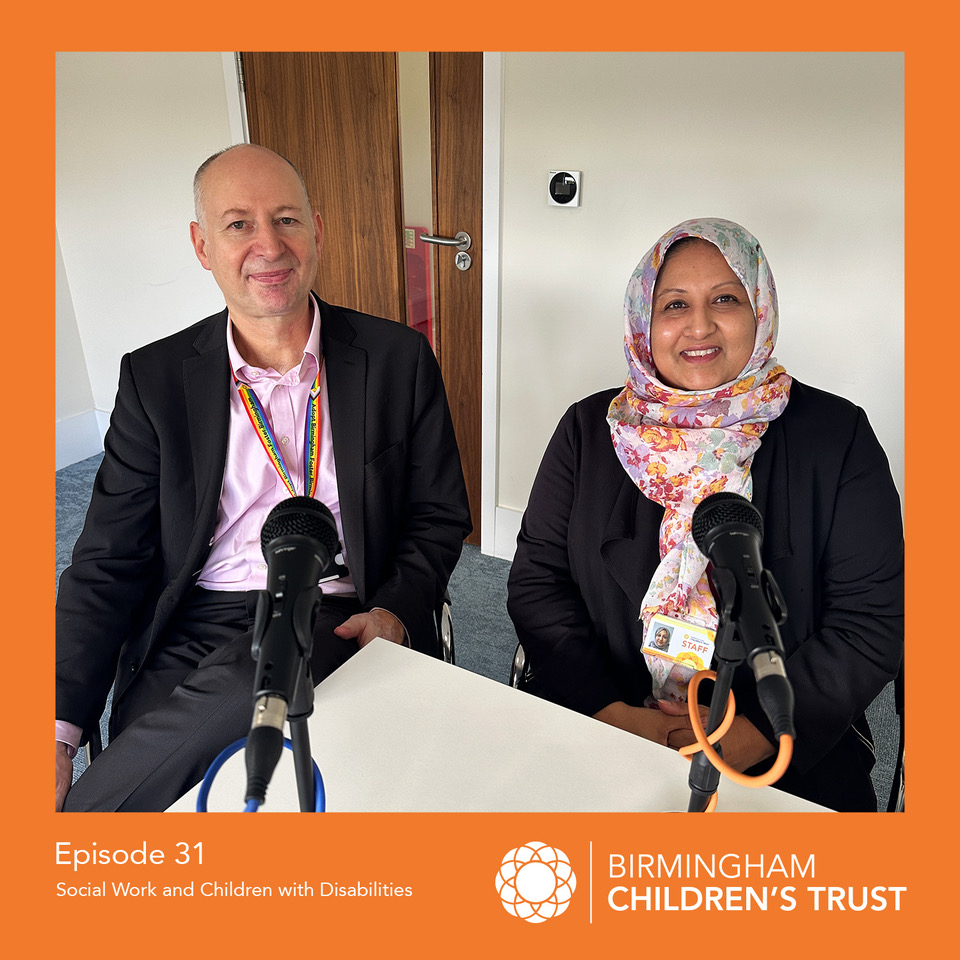Trust social workers impress inspectors after latest Ofsted Focused Visit of children’s services
 Published: 24th Oct 2024
Published: 24th Oct 2024
Read about the findings from Ofsted's latest Focused Visit, looking at Birmingham children's services...
Social Workers are the ‘shining stars’ according to Birmingham Children’s Trust Chief Executive, James Thomas, following the latest Focused Visit by Ofsted inspectors to look at children’s services in Birmingham.
The visit, conducted in September 2024, had inspectors looking closely at Birmingham City Council’s services for children in care, with a particular focus on the quality of matching, placement and decision-making for children in care, experiences of disabled children in care and progress of children living in supported accommodation or an unregistered children’s home.
Since 2018 Birmingham City Council has commissioned Birmingham Children’s Trust to deliver children’s social care services, including for children in care, but maintains an oversight over children’s services in the city.
James Thomas, Birmingham Children’s Trust Chief Executive, said: “I am extremely proud of the outcome of the latest Ofsted visit to inspect children’s services, with a focus on the Trust responsibility for children in care. The findings reinforced our continued development as a citywide children’s services partnership with the city council, proving our collective dedication to providing the best possible support for children, young people and families in Birmingham.
“The development of children’s services in Birmingham since the Trust launched in 2018 has been one of sustained improvement, from being judged as ‘Good’ in April 2023, to this Focused Visit.
“This visit has highlighted what a key role our social workers play in improving outcomes for children and families daily, especially in light of the challenges caused by the current financial climate.
“The work we do as Trust is never done alone, and whilst the visit focused on the Trust’s work supporting children in care, we wish to acknowledge the ever-stronger partnership with the city council, with our statutory partners and with the voluntary and community sector, as without this collective effort we would not have this stability and sense of reassurance that we are headed in the right direction."
Sue Harrison, Strategic Director for Children and Families at Birmingham City Council, said: “The outcome of this latest Focused Visit by Ofsted is one of sustained progress, meaning children’s services in Birmingham are continuing to improve.
“We were delighted to read that inspectors were impressed with how well Trust social workers know their children, and their relational practice, highlighting their passion and confidence. Ofsted noted social workers spoke with pride about their children and were not afraid to express their love for them.
“There are still improvements that we can collectively make, but at a time when children’s social care hits the headlines usually for the wrong reasons, we are very grateful to our social workers and all their Trust and city council colleagues that enable our social workers to be at their best.”
Councillor Mick Brown, Birmingham City Council Cabinet Member for Children, Young People and Families, said: “Whilst the city council faces significant financial challenges it was very rewarding to read Ofsted recognise that we have kept the needs of vulnerable children, especially children in care in Birmingham, as a priority.
“Birmingham Children’s Trust is doing a terrific job in progressing the way it is providing children’s social care at the highest level, and staff across the Trust need to be applauded for their unwavering focus on supporting children and families to thrive.
“To have Ofsted recognise key elements of children’s social work practice in a positive light, from strong listening skills to doing all that is safely possible to keep families together, is excellent news, and we thank all the city council and Trust staff for their continual commitment to safeguard and support children and families.”
Further information about the Focused Visit
Highlighted comments from Ofsted said about children in care services in Birmingham, delivered by Birmingham Children’s Trust:
On relationships between Trust social workers and children in care:
“Many children benefit from meaningful relationships with social workers who have taken time to build strong and caring relationships with them. Social workers speak with pride about their children and say things like, 'I love them'.”
On listening to the voice of children in care:
“Children are listened to, including their views about where and with who they live. Social workers use the relational practice model effectively promoting ongoing relationships and supporting children to spend time with family members in appropriate venues.”
On support to children in care:
“Visits to children are used by social workers to explore children’s wishes and anxieties about how well family time is progressing. Plans are adapted in accordance with children's views. Where children in care are at risk, they receive timely and proportionate responses to reduce risk and help to keep them safe.”
On the health needs of children in care:
“Children's health needs are promoted. Children have regular health assessments and attend opticians’ and dental appointments as required. Children's emotional wellbeing and mental health needs are met through the Trust’s own therapeutic emotional support service (TESS) as well as receiving therapeutic support provided where children live and go to school.”
On the educational needs of children in care:
“Most children are making academic progress at school. Social workers work collaboratively with the virtual school and education partners to good effect. Regular personal education plan meetings (PEPs) take place to ensure that appropriate support is in place for children. When older children are not attending education, training and employment social workers support them to pursue their interests to find the right college place or apprenticeship.”
On the social needs of children in care:
“Children are encouraged to pursue their interests and hobbies. This helps them to have fun and socialise. There has been an increase in the number of unaccompanied asylum-seeking children in care. They receive a timely response, with a well-coordinated offer of support and decisions to accommodate are made promptly. Children’s wide-ranging needs are well met, including access to legal advice to progress asylum claims. Social workers place an emphasis on education with all attending school or college.”
On the living arrangements of children in care:
“Children are supported to live close to others from their community with access to local amenities to support their cultural and identity needs. Social workers are also curious and alive to the vulnerability of this group of children. As a result, children are settled and supported. Many children are living in stable and settled homes where they can thrive. Where possible they are living with their family or brothers and sisters. Social workers understand the benefits of these arrangements in respect of children’s identity and sense of belonging.”
On children in care with disabilities:
“Disabled children who are in care benefit from consistent and strong relationships with their social workers. Social workers visit children regularly and communicate with them in a style that meets the child's needs. This ensures that children’s need and wishes are well understood to inform their care planning. Most disabled children are living in suitable homes where they are happy, thriving and making good progress. Social workers explore opportunities for permanence through special guardianship for disabled children where this is appropriate.”
On kinship care for children in care:
“Social workers complete comprehensive and timely initial viability assessments when plans are explored for children to live in kinship care. For some children in long term kinship care consideration is given to plan of special guardianship orders being made.”
On early permanence for children in care:
Children in care are well supported by caring social workers with a focus on achieving early permanence for them. Opportunities for early permanence through foster to adopt are explored when parental or kinship care is not possible. Social workers have a good understanding of children's needs, the impact of moving on from carers and how to manage this support sensitively. Care and attention are taken to ensure that children are appropriately matched with adopters who can best meet their needs. When a match is made, prompt, creative and carefully considered transition plans are developed at a pace to support children to settle within their adoptive homes.”
On children in care living in supported accommodation:
“Children who are living in supported accommodation are receiving the right level of help to enable them to develop their independence and prepare for adult life while living in a nurturing environment. Their views are respected and advocated for with children’s voices shaping future care planning. Children are visited regularly by social workers who know them well. The frequency of visiting reflects children’s changing needs.”
On unregulated placements for children in care:
“The Trust has significantly reduced the number of children living in unregistered children’s homes since the last inspection (in April 2023) through the development of a greater variety of resources and improved relationships with providers. Currently, a very small number of children are living in unregistered children’s homes.”
On regular support for Trust social workers:
“Social workers told inspectors that they feel well-informed about changes within the Trust. They receive weekly blogs and ‘shout outs’ from senior leaders which promote positive morale within the workforce. Social workers benefit from a comprehensive training offer. They enjoy using the relational practice model ‘Connections Count’ which informs their practice.”
On support for newly qualified Trust social workers:
Newly qualified social workers receive good levels of support. They describe their induction positively and value the monthly training with their peer cohort. The capped caseloads they have supports their development. Social workers are positive about the support they receive from managers and leaders at all levels.”
On caseloads for Trust social workers:
“Caseloads are manageable, and social workers report that they are busy, but they feel well supported in their practice. Consequently, social workers are able to develop meaningful relationships with children. They demonstrate a real curiosity and passion to ensure they listen to children and are effective in meeting their needs. Social workers are proud of their work and their children's progress.”Areas for improvement within support for children in care:
- The strategic and managerial oversight of a small number of children living in unregistered children’s homes.
- The pace that decisions and action to change the legal status of a small number of children living in permanent stable homes.
On leadership within the Trust:
“Senior leaders in the Trust understand the strengths and challenges within their service. The high levels of child poverty in the city, coupled with the cost of living crisis, place pressures on resources. A recent planned restructuring of the senior leadership team has taken place, streamlining capacity. New improvement plans overseen by an improvement board have also been developed to drive forward plans focusing on earlier intervention, embedding and gaining greater consistency of practice.”
Read a full copy of the letter published by Ofsted (24 October 2024).
Working for the Trust
To find out more about joining us, and working at Birmingham Children's Trust, visit our dedicated recruitment site.

Our latest podcast
Following on from the Ofsted Focused Visit, you can listen to our latest podcast, featuring Trust Chief Executive, James Thomas, taking to Noreen Hussain, Trust Senior Social Worker, about children in care with disabilities. Noreen spoke directly to Ofsted in September 2024 during the Focused Visit.
Enjoy!